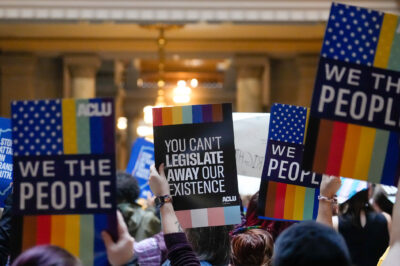New Jersey Gov. Chris Christie has multiple personalities: the national political figure and the one at home. His record on civil liberties is as complex as he is, as the ACLU-NJ showed this week in its midterm report card of his administration.
His peculiar role gives him two opposing concerns: maintaining the adulation of his party’s most vocal factions, which have identified him as a rising star, and satisfying the will of the people as the moderate Republican governor of a state with strong liberal leanings. To boot, the reasons for his national rise in prominence mainly involve issues unrelated to civil liberties.
No issue tells the story of Christie’s dueling political personas better than this week’s gambit on the freedom to marry. A vocal supporter of the LGBT community in principle (earning him a B- in our report card), he often comes out swinging in the defense of LGBT rights. However, his fear of making enemies seems to stop him just short of supporting marriage. This week, he suggested an alternative to a bill allowing marriage, which just passed the New Jersey Senate Judiciary Committee for a vote in the chamber: punting it to the voters themselves, letting Christie off the hook for either signing (and angering his party) or rejecting (and angering the majority of New Jerseyans) a bill giving gay and lesbian couples the freedom to marry.
Individual freedoms should not rely on the majority’s approval of them, and, in a situation where he will have to alienate someone, he should make the decision that in his heart he knows is right: extending equal rights.
Christie wouldn’t get very far in the densest, most diverse state in the union if he governed from a place of prejudice. His cool head brought him national attention twice in the past few years, when he insisted on a return to common sense on anti-Muslim bigotry (giving him a B in religious freedom — his support for vouchers, which uses taxpayer dollars to fund private, religious and parochial schools, took him down a notch). First, in 2010, when plans to build an Islamic cultural center near Ground Zero sparked outrage, Christie emphasized the key role American Muslims play in civic life. He urged reason again a year later, in August 2011, when he stamped out a witch hunt that rose up against his decision to appoint Sohail Mohammed, a Muslim, as a Superior Court judge. He blamed the irrational hatred of Muslims on “ignorance,” plainly and simply.
When misplaced, Christie’s strong opinions of those he disagrees with, backed by the authority of the chief executive, ran afoul of others’ First Amendment rights (he got an F in this category). He said he had “no problem” when New Jersey Transit fired employee Derek Fenton for political speech during his personal time. The courts, however, did have a problem, and the ACLU-NJ won Fenton’s job back. And in 2011, Christie said he understood Occupy Wall Street demonstrators would take their message to the streets, but he stood on the sidelines when the New Jersey Department of Military and Veterans Affairs trampled on the rights of Occupy Trenton just blocks away from his office.
His actions on women’s health have been markedly deplorable, turning the lives of women into a political football (and earning him an F in this area as well). He cut all funding for women’s health care from the state budget, reducing basic access medical treatment for women and children in need, and he withdrew a pending application for federal family planning funding.
New Jersey is lucky to have a governor who genuinely speaks his mind, and occasionally one who chooses to break with his party in order to do the right thing. In this midterm evaluation, we ask him to commit to stepping in others’ shoes more often, appreciating the view from the perspective of the people his actions affect.
Most of all, we want to keep Christie on his toes. The whole state is watching. We’re ready to call him out when he acts inappropriately or abuses his authority.
We’re just as ready to pile on the praise when he does the right thing — especially in situations where the noble decision may not be the most popular one, especially when he has so many groups to please. We’ll give him cover, but only when he deserves it by standing up for everyone in his state, not just those who agree with him.
Learn more about civil liberties: Sign up for breaking news alerts, follow us on Twitter, and like us on Facebook.



